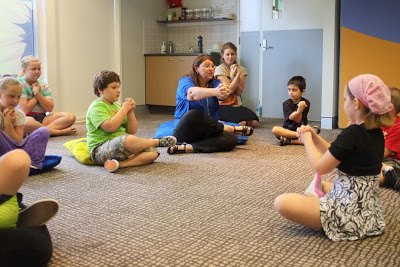Children’s Learning
Things You Can Do for Your Child’s Emotional Development
You work hard for the kids so you can give them the best future you could possibly ever hope for. But is that enough? You spend most of your time at work and you rarely talk with your child. You just make sure he/she is taken care of. As a parent, you should put more effort. Sometimes you need to step back from the busy life and take a closer look at your child then you will realize what he/she really needs from you.

Children need your constant love and support. While you are busy stomping the streets of Singapore, they just want you to tuck them to bed and read stories. Actually, children need only one thing – to be a part of your everyday life by being there for them. In case you forgot, here are the things your child needs from you:
- Have one-on-one moments. Your kids understand that you have to work for a living but when you put it aside for few hours for them, they will see that they are also the priority and they will realize how you care for them. It is important that you spend quality one-on-one time with your kids especially during their formative years. Forget about work for few hours and play with your toddler or read them bed time stories.
- Turn off all distractions. It is easy to get hooked to a television if it is turned on or a mobile phone if it has internet. It doesn’t matter if you are physically present but your mind is wandering. Your kids will still not appreciate it. When you are with kids, the best thing that you should do is to limit the screen time. Step away from it and have an actual bonding with the kids.

- Show affection. It is not enough that you say “I love you” to them. You have to act it or show it. It is important that as parents, you show subtle signs of affection like kiss and hug because kids will emulate it in their later years.
- Listen to their ideas (or ramblings). Be a good confidante because if kids trust you with littlest things, they will tell you bigger things as they grow up. You have to listen to their ideas even ramblings because that is how it is. Do not just listen with your ear. Listen with your heart as well. Your kids will surely appreciate it.
Raising a kid is not easy that is why you have to be familiar of their needs.

8 Ways to Encourage Your Toddler’s Speech Development
Parents play a crucial role in a child’s speech development. Singapore studies have shown that those children who are spoken with and read to a great deal during their early years will have better grammar and larger vocabularies compared to those who have less. As parents, here are some simple ways to help your child’s speech development.

- Talk to your child, even if he can’t understand you yet.
Narrate to your child what’s currently happening. For instance, tell your child, “Now we’ll take bath. Is the water warm? After this, we’ll get dressed and stroll at the park.” Small talks like this encourage your child to listen and mimic the sounds he hears from you.
- Read him more books.
It’s never too early to read to your infant. A good predictor of future language success is the amount of time parents spent reading to their child. You can start with board books, and then move to picture boards and longer stories as your child gets older. Story times at a Singapore library can also help your toddler develop a love for reading.
- Give your child some ‘space’ to talk…
It’s natural to feel the urge to talk when your child doesn’t respond promptly. However, it’s also important to give your toddler some time to ponder and express what he wants to say. When you ask your child a question or noticed that your child want something, pause for a few seconds while looking at him expectantly. Once you notice any body movement or sound, respond to him promptly. Your response helps your toddler to feel encouraged to communicate.
- …But don’t finish his sentence.
Do respond promptly when you see signs of response from your child, but do not finish his sentence just because you noticed that he’s struggling with words. By finishing his sentence, you’re not encouraging your little one healthy, independent conversational skill. Your child may think that they should let other people do the talking for them. positively reinforce your child’s achievement after getting stuck for a few minutes by telling them things like, “Wow, you’re a good speaker.”

- Simplify the use of language.
Doing this helps your child follow what you are saying. It also makes it easier for him to imitate speech. If your child still doesn’t know how to talk speak in single words (if he’s playing with a ball, say ‘ball’ or ‘roll.’) If your toddler is speaking mostly in single words, speak with him in short phrases, such as ‘throw ball’ or ‘roll ball.’ The key here is to use the one-up rule: Use phrases that has one more word than your child often uses.
- Do the talking turns.
Getting into conversation is traditionally hard for a child who stutters, and managing multiple conversational partners can be overwhelming for your little tot. However, you can model conversational turns in the family. Encourage conversations within siblings (or one or both parents) to encourage taking turns when talking. For example, you can do this as a form of game where each person has their own turn. Start by telling your child something like this: “First, it’s Ara’s talking turn, then it’ll be your talking turn.” To prompt a child that’s interrupting a conversation, you can say, “I can see you have something to tell dad, but it’s my talking turn right now. After me, it’s your talking turn with dad.”
- Help your child organize stories.
Help your little kid organize their story by structuring it through questions (what, where, who, etc.) “Mommy wants to hear this story. Let’s start this together. Who’s in this story?… Where did this story happen?… Okay I would love to hear more. What happens now?…” Also, help structure sequence by using first-then statements. “The first part of the story is… And then…” This way, you’re encouraging your child to analyze and talk more.
- Show your child you enjoy talking with him.
Smile and reinforce your child’s willingness to share ideas and communicate with you. Even if your toddler isn’t fluent yet, help them enjoy talking and show appreciation for what they have achieved. If your child tells you a story and got really stuck in the middle of his story, you can still reinforce communication by saying something like, “I love listening to your stories” or “Wow! That’s a good story. I’m happy you told me about that.”
Using these simple tricks that necessitates your little ones to communicate will encourage your child’s speech development. However, keep in mind that these things should be done with love and patience. When your child feels that he’s appreciated and loved despite the mistakes, it will give him confidence to continue the process.

How to Get and Maintain Children’s Attention
If you’re a teacher trying to teach a class of your children, your first and biggest challenge is probably how to keep their attention. Here are 10 tricks to help you:

- Set rewards for good behavior. Whether you follow a “star system” or give treats, giving children a tangible reward for behaving well is probably the most effective trick on the book.
- Turn your lessons into a game. Children naturally love to play so if your lessons feel like a game, you’ll have their undivided attention.
- Use stories to deliver your lessons. Kids don’t typically like to memorize facts, but they will easily follow an interesting story. If they remember the story, they’ll probably also remember its lesson. This is especially helpful if you’re trying to teach life lessons and moral values.
- Let them know the time. If your audience aren’t particularly interested in your lesson, letting them know that you will eventually stop—and when—will help maintain their patience and pay attention to you for a few minutes longer.
- Have a familiar call phrase. Teach the children that if, for example, you say “Hep-hep!” they have to reply with “Hurray!” They will try to anticipate this, and that means you have their attention.

- Make them use a signal. Teach them a signal that indicates that they have something to say. If you have a question for the whole class, wait until everyone has made the signal before choosing someone to answer you.
- Establish a “super quiet time”. Inform them when they have to be absolutely quiet—usually prior to story-time or giving of awards—warning that if they fail, you may not be able to give them their treat.
- Have a group song. When things get a little out of hand, break into a familiar song and make everyone sing along to get their focus back to you.
- Follow a routine. Children like to follow routines because it gives a sense of order in a world that they don’t completely understand. Children also love to do things that they’re confident that they know how.
- Encourage teamwork. Divide the children into groups and make them do something together. Let them know that they’ll be awarded based on their cooperation with each other.

